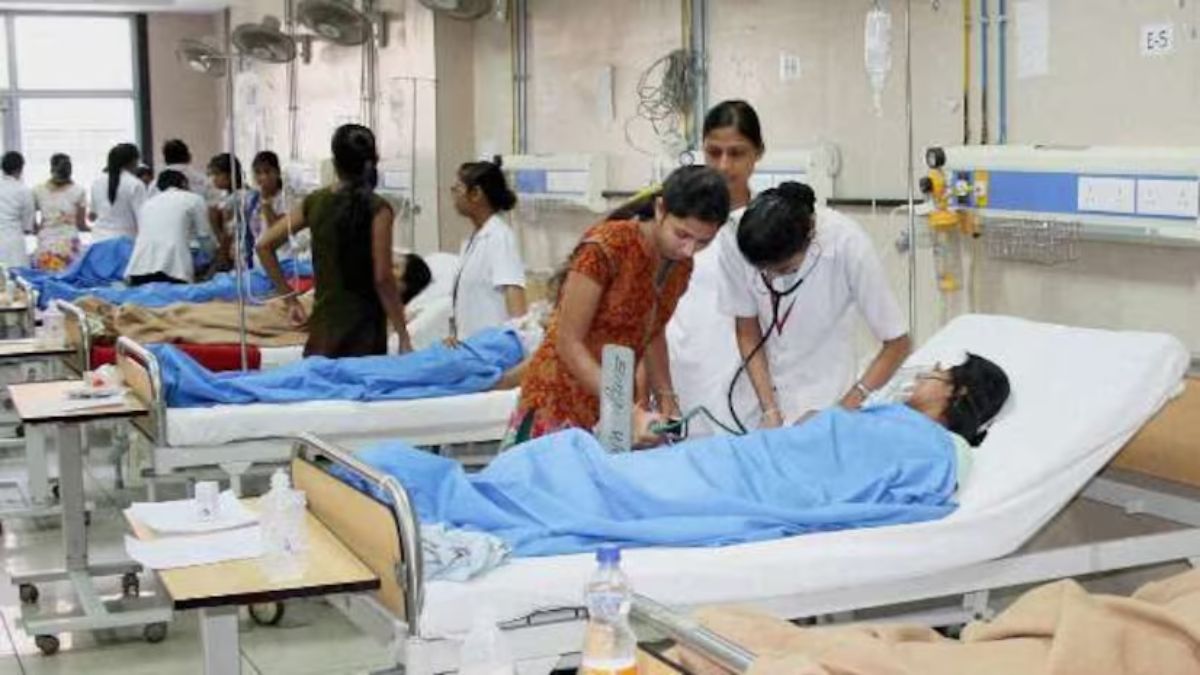Cases of Guillain-Barre Syndrome (GBS) are on the rise in both Maharashtra and West Bengal, triggering concern among health officials.
As of January 29, Maharashtra’s Public Health Department has recorded over 120 cases of this rare immunological nerve disorder. Among them, 20 patients are currently on ventilator support. Meanwhile, in West Bengal, three people— including a child— have lost their lives to the autoimmune disease in the past four days.
As health authorities continue to investigate, here’s a look at what’s unfolding in both cities and the potential reasons behind this outbreak.
Guillain-Barre Syndrome in Maharashtra
Maharashtra is grappling with a significant outbreak of Guillain-Barre Syndrome (GBS), with over 120 reported cases and two deaths so far.
Earlier this week, a 40-year-old man from Solapur succumbed to the disease. Reports suggest he had recently travelled to
Pune, where he may have contracted the infection. On Tuesday, a 56-year-old woman also lost her life while undergoing treatment at Pune’s Sassoon General Hospital, according to The Times of India.
As of January 30, 16 new cases have been recorded, pushing the total count to 127.
Data from the Maharashtra Health Department shows that 23 patients are from Pune Municipal Corporation (PMC) areas, 73 cases have emerged from newly integrated villages under PMC limits, 13 patients are from Pimpri-Chinchwad Municipal Corporation (PCMC), while nine cases each have been reported from Pune’s rural areas and other districts in the state.
With cases rising rapidly, Health Minister Prakash Abitkar told ANI that contaminated water sources in Pune could be a key factor behind the outbreak.
Of the 144 water samples sent for chemical and biological testing at the Public Health Laboratory, eight were found to be contaminated. These samples were collected from different parts of the city.
“Patients with GB syndrome are increasing in Pune, which has become a matter of concern. We will soon get the opinion of our expert team of doctors regarding GBS (Guillain-Barre Syndrome) patients. The Pune Municipal Corporation and the Maharashtra Health Department are working well so that the number of patients does not increase,” said Abitkar.
To contain the spread, he said PMC is taking immediate steps, including repairing 12 leaks, replacing a drainage line, and ensuring adequate ventilator support and medical supplies for affected patients.
Guillain-Barre Syndrome in West Bengal
Following Maharashtra, West Bengal is also witnessing a concerning rise in Guillain-Barré Syndrome (GBS) cases, with children among those affected.
According to The Indian Express, two people—a 10-year-old and a 17-year-old—have reportedly died of suspected GBS in the state.
The 10-year-old child, a resident of Jagatdal in North 24 Parganas, had been undergoing treatment at BC Roy Hospital in Kolkata for a week before passing away on Sunday.
Meanwhile, a 17-year-old from the same district, who exhibited symptoms of the syndrome, died at NRS Medical College and Hospital on Monday. Hospital sources revealed that the teenager succumbed to septic shock and myocarditis, though doctors suspect GBS may have been the underlying cause.
On Wednesday, a 48-year-old man from Hooghly was also suspected to have died from the suspected immunological nerve disorder. However, the state health department has yet to officially confirm the exact cause of the recent deaths.
According to a PTI, four more children with suspected GBS symptoms are currently receiving treatment at BC Roy Hospital and the Institute of Child Health.
Also read:
10 risky foods that can trigger Guillain-Barre Syndrome
What is Guillain-Barre Syndrome?
Guillain-Barre Syndrome (GBS) is a rare neurological disorder in which the immune system mistakenly attacks the peripheral nerves, leading to weakness, numbness, and, in severe cases, paralysis.
The immune system is the body’s natural defence against infections, while the peripheral nervous system consists of nerves outside the brain and spinal cord. When GBS occurs, the immune system mistakenly targets these nerves, disrupting communication between the brain and muscles.
The condition was first identified in 1916 by French neurologists Georges Guillain and Jean Alexandre Barre, after whom it is named.
Common symptoms include fever, cough, runny nose, muscle weakness, and gastrointestinal issues like stomach pain and diarrhoea. According to the Mayo Clinic, most individuals diagnosed with GBS have experienced an infection at least six weeks before symptoms appear.
What’s behind the rapid spread of GBS?
While the exact cause of GBS remains under investigation, it is often linked to major surgeries, vaccinations, or bacterial and viral infections.
Health authorities suspect that Campylobacter jejuni, a bacteria commonly found in poultry intestines, could be a major factor behind the recent surge in cases.
The Economic Times reports that this bacterium, also known as campylobacteriosis, spreads through contaminated or undercooked meat, unpasteurised dairy products, and untreated water.
Symptoms of C. jejuni infection include abdominal cramps, fever, nausea, vomiting, and, in some cases, bloody diarrhoea. These symptoms typically appear within two to five days of exposure and can last for about a week.
How is GBS treated?
Although there is no specific cure for GBS, treatment can help alleviate symptoms and speed up recovery.
Dr Bhushan Joshi, Consultant – Neurology at Manipal Hospital, Kharadi, Pune, told The Hindustan Times, “Immediate intervention is required to reduce problems and improve recovery prospects. Intravenous immunoglobulin (IVIG) therapy and plasmapheresis (plasma exchange) are most often used to treat the symptoms.”
While there is no vaccine specifically for GBS, certain vaccinations—such as flu and Zika virus vaccines—can help reduce the risk of infections that may trigger the disease.
To prevent infection, experts recommend proper cooking of meat, avoiding cross-contamination, washing hands frequently, and consuming only clean water.
With input from agencies

)




